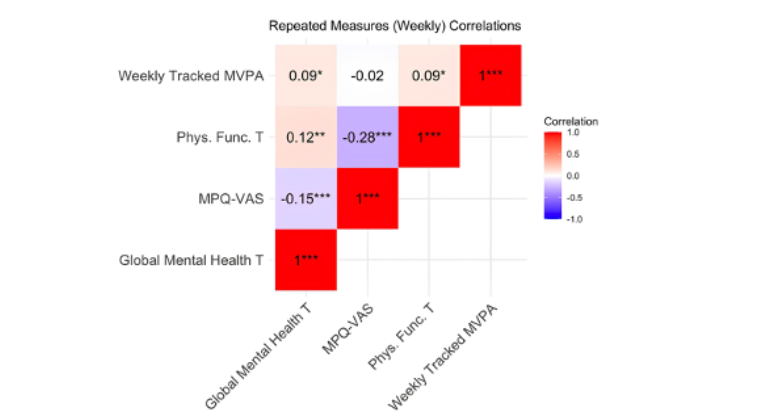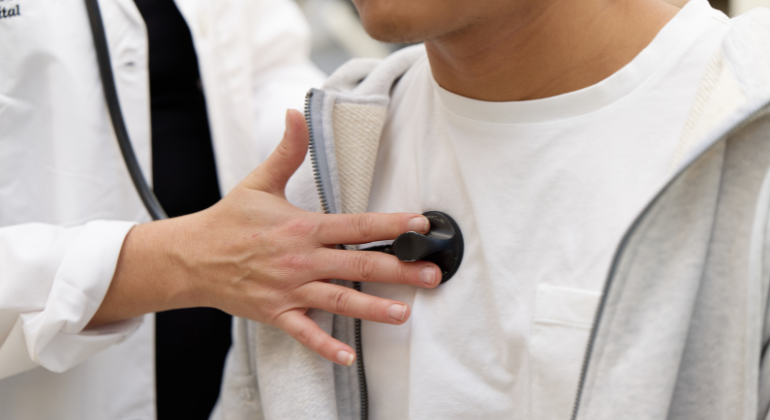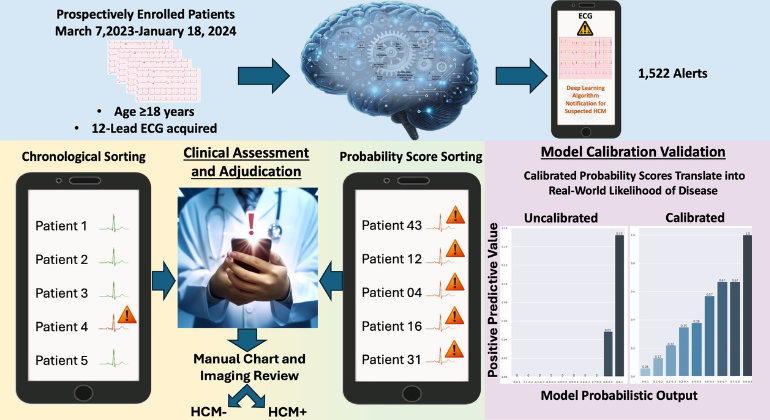Mount Sinai Receives $3.32 Million Grant to Study New Tool That Predicts Effectiveness of Obstructive Sleep Apnea Treatment
Artificial intelligence-based tool would give confidence to clinicians and patients that treatment will address sleep apnea and lower cardiovascular disease risk

The Icahn School of Medicine at Mount Sinai has been awarded a $3.32 million, four-year grant from the National Heart, Lung and Blood Institute of the National Institutes of Health (NIH) to study a new artificial intelligence (AI)-based tool that has the potential to predict cardiovascular event risk and treatment response among individuals with obstructive sleep apnea (OSA). The findings from this study could help clinicians make more informed recommendations about OSA treatment for their patients.
Obstructive sleep apnea affects more than 30 million Americans, according to the American Medical Association, and is associated with an increased risk for cardiovascular morbidity and mortality. The primary tool for assessing OSA severity is the apnea-hypopnea index, which counts the incidents when an individual stops breathing and the periods when their breathing is shallow due to blockage of the airways. However, the tool does not accurately predict cardiovascular disease risk, and reducing a patient’s apnea-hypopnea index through continuous positive airway pressure (CPAP) therapy—the primary treatment for OSA—does not always result in benefits.
“There is no reliable tool for physicians to assess which sleep apnea patients are at highest risk for cardiovascular events, or which patients are likely to respond to, or even be harmed by, CPAP therapy. That makes it difficult to determine which individuals should be escalated for treatment,” said Girish N. Nadkarni, MD, MPH, Chair of the Windreich Department of Artificial Intelligence and Human Health, Director of the Hasso Plattner Institute for Digital Health, and Irene and Dr. Arthur M. Fishberg Professor of Medicine at the Icahn School of Medicine at Mount Sinai, and Chief AI Officer for the Mount Sinai Health System.
“We have developed an approach that we believe can analyze complex sleep study data, and now we will use it to make reliable predictions regarding cardiovascular risk and treatment response. We are grateful to the National Heart, Lung and Blood institute for their generous support of our study, which has the potential to be transformative for clinicians and patients,” Dr. Nadkarni added.
The AI-based predictive tool was developed using data from epidemiology studies involving individuals who had and did not have an OSA diagnosis. The tool uses a technique known as transformer-based neural networks, or transformers, to analyze data from polysomnograms—sleep studies that collect data based on up to 20 parameters, including heart rate, muscle movements, and brain activity. The volume and complexity of the data gathered during these tests is such that these parameters have often been assessed in isolation in making decisions about CPAP therapy among OSA patients.
“Traditionally, it was challenging to determine how these parameters work in conjunction to either increase cardiovascular risk or the likelihood that a patient would respond favorably to treatment," said Neomi A. Shah, MD, Vice Chair of Medicine, Associate Dean and Professor of Medicine (Pulmonary, Critical Care and Sleep Medicine) at the Icahn School of Medicine at Mount Sinai.
“Advances in artificial intelligence, specifically transformers, are making it possible for us to analyze all the sequential data generated by attended and unattended/home sleep studies and capture complex patterns that can inform decisions on CPAP treatment. By drawing on these advances, we believe our tool has the potential to offer clinicians insights that increase their confidence that the treatment recommendations they make are the right ones for their patients and their cardiovascular health.”
The goal of the study is to refine the tool using data from randomized clinical trials testing CPAP versus usual care on cardiovascular disease outcomes and then compare risk prediction and treatment response to clinical metrics such as the apnea-hypopnea index to assess how well it will work in a clinical setting.
“If we are successful, it would open the door for clinicians to stratify and get patients started on CPAP treatment sooner and may uncover new health-relevant sleep features for clinical application that provide a deeper understanding of the connections between OSA and cardiovascular disease,” said Ankit Ashok Parekh, PhD, Associate Professor of Medicine (Pulmonary, Critical Care and Sleep Medicine), and Artificial Intelligence and Human Health, at the Icahn School of Medicine at Mount Sinai. “That will be life-changing for millions of patients who have been diagnosed with OSA.”
“By applying transformer models within a rigorous causal inference framework, we aim to move beyond risk prediction and estimate how CPAP therapy modifies cardiovascular risk,” said Mayte Suarez-Fariñas, PhD, Assistant Director of the Center for Biostatistics and Professor of Population Health Science and Policy, and Genetics and Genomic Sciences, at the Icahn School of Medicine at Mount Sinai. This focus on treatment effect is essential for identifying which patients are most likely to benefit, and for translating AI models into actionable, personalized care.”
The principal investigators for this study are Drs. Nadkarni, Shah, Parekh, and Suarez-Fariñas, who bring complementary expertise in artificial intelligence, clinical sleep medicine, cardiovascular research, and statistical methodology.
“This diversity of skills and perspectives reflects the principles of modern team science and is essential for tackling the complexity of sleep apnea and cardiovascular disease,” said Dr. Nadkarni.
The NIH grant award number is R01HL175992.
For more Mount Sinai artificial intelligence news, visit: https://icahn.mssm.edu/about/artificial-intelligence.
About Mount Sinai's Windreich Department of AI and Human Health
Led by Girish N. Nadkarni, MD, MPH—an international authority on the safe, effective, and ethical use of AI in health care—Mount Sinai’s Windreich Department of AI and Human Health is the first of its kind at a U.S. medical school, pioneering transformative advancements at the intersection of artificial intelligence and human health.
The Department is committed to leveraging AI in a responsible, effective, ethical, and safe manner to transform research, clinical care, education, and operations. By bringing together world-class AI expertise, cutting-edge infrastructure, and unparalleled computational power, the department is advancing breakthroughs in multi-scale, multimodal data integration while streamlining pathways for rapid testing and translation into practice.
The Department benefits from dynamic collaborations across Mount Sinai, including with the Hasso Plattner Institute for Digital Health at Mount Sinai—a partnership between the Hasso Plattner Institute for Digital Engineering in Potsdam, Germany, and the Mount Sinai Health System—which complements its mission by advancing data-driven approaches to improve patient care and health outcomes.
At the heart of this innovation is the renowned Icahn School of Medicine at Mount Sinai, which serves as a central hub for learning and collaboration. This unique integration enables dynamic partnerships across institutes, academic departments, hospitals, and outpatient centers, driving progress in disease prevention, improving treatments for complex illnesses, and elevating quality of life on a global scale.
In 2024, the Department's innovative NutriScan AI application, developed by the Mount Sinai Health System Clinical Data Science team in partnership with Department faculty, earned Mount Sinai Health System the prestigious Hearst Health Prize. NutriScan is designed to facilitate faster identification and treatment of malnutrition in hospitalized patients. This machine learning tool improves malnutrition diagnosis rates and resource utilization, demonstrating the impactful application of AI in health care.
For more information on Mount Sinai's Windreich Department of AI and Human Health, visit: ai.mssm.edu
About the Hasso Plattner Institute at Mount Sinai
At the Hasso Plattner Institute for Digital Health at Mount Sinai, the tools of data science, biomedical and digital engineering, and medical expertise are used to improve and extend lives. The Institute represents a collaboration between the Hasso Plattner Institute for Digital Engineering in Potsdam, Germany, and the Mount Sinai Health System.
Under the leadership of Girish Nadkarni, MD, MPH, who directs the Institute, and Professor Lothar Wieler, a globally recognized expert in public health and digital transformation, they jointly oversee the partnership, driving innovations that positively impact patient lives while transforming how people think about personal health and health systems.
The Hasso Plattner Institute for Digital Health at Mount Sinai receives generous support from the Hasso Plattner Foundation. Current research programs and machine learning efforts focus on improving the ability to diagnose and treat patients.
About the Icahn School of Medicine at Mount Sinai
The Icahn School of Medicine at Mount Sinai is internationally renowned for its outstanding research, educational, and clinical care programs. It is the sole academic partner for the seven member hospitals* of the Mount Sinai Health System, one of the largest academic health systems in the United States, providing care to New York City’s large and diverse patient population.
The Icahn School of Medicine at Mount Sinai offers highly competitive MD, PhD, MD-PhD, and master’s degree programs, with enrollment of more than 1,200 students. It has the largest graduate medical education program in the country, with more than 2,600 clinical residents and fellows training throughout the Health System. Its Graduate School of Biomedical Sciences offers 13 degree-granting programs, conducts innovative basic and translational research, and trains more than 560 postdoctoral research fellows.
Ranked 11th nationwide in National Institutes of Health (NIH) funding, the Icahn School of Medicine at Mount Sinai is among the 99th percentile in research dollars per investigator according to the Association of American Medical Colleges. More than 4,500 scientists, educators, and clinicians work within and across dozens of academic departments and multidisciplinary institutes with an emphasis on translational research and therapeutics. Through Mount Sinai Innovation Partners (MSIP), the Health System facilitates the real-world application and commercialization of medical breakthroughs made at Mount Sinai.
-------------------------------------------------------
* Mount Sinai Health System member hospitals: The Mount Sinai Hospital; Mount Sinai Brooklyn; Mount Sinai Morningside; Mount Sinai Queens; Mount Sinai South Nassau; Mount Sinai West; and New York Eye and Ear Infirmary of Mount Sinai.
About the Mount Sinai Health System
Mount Sinai Health System is one of the largest academic medical systems in the New York metro area, with 48,000 employees working across seven hospitals, more than 400 outpatient practices, more than 600 research and clinical labs, a school of nursing, and a leading school of medicine and graduate education. Mount Sinai advances health for all people, everywhere, by taking on the most complex health care challenges of our time—discovering and applying new scientific learning and knowledge; developing safer, more effective treatments; educating the next generation of medical leaders and innovators; and supporting local communities by delivering high-quality care to all who need it.
Through the integration of its hospitals, labs, and schools, Mount Sinai offers comprehensive health care solutions from birth through geriatrics, leveraging innovative approaches such as artificial intelligence and informatics while keeping patients’ medical and emotional needs at the center of all treatment. The Health System includes approximately 9,000 primary and specialty care physicians and 10 free-standing joint-venture centers throughout the five boroughs of New York City, Westchester, Long Island, and Florida. Hospitals within the System are consistently ranked by Newsweek’s® “The World’s Best Smart Hospitals, Best in State Hospitals, World Best Hospitals and Best Specialty Hospitals” and by U.S. News & World Report's® “Best Hospitals” and “Best Children’s Hospitals.” The Mount Sinai Hospital is on the U.S. News & World Report® “Best Hospitals” Honor Roll for 2025-2026.
For more information, visit https://www.mountsinai.org or find Mount Sinai on Facebook, Instagram, LinkedIn, X, and YouTube.

AI System Finds Crucial Clues for Diagnoses in Electronic Health Records
Oct 15, 2025 View All Press Releases
Adding a Lookup Step Makes AI Better at Assigning Medical Diagnosis Codes
Sep 25, 2025 View All Press Releases
Like Humans, AI Can Jump to Conclusions, Mount Sinai Study Finds
Jul 22, 2025 View All Press Releases
Physical Activity Boosts Mental Health in Women With Chronic Pelvic Pain Disorders
Feb 26, 2025 View All Press Releases
